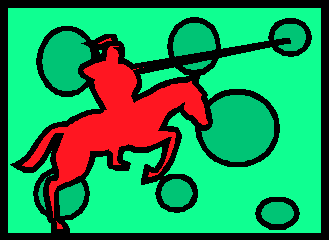STANZA OF ANGLO-SAXON POETRY
'Twas bryllyg, and ye slythy toves
Did gyre and gymble in ye wabe:
All mimsy were ye borogoves;
And ye mome raths outgrabe.
This curious fragment reads thus in modern characters:
'Twas bryllyg, and the slythy toves
Did gyre and gymble in the wabe:
All mimsy were the borogoves;
And the mome raths outgrabe.
The meaning of the words are as follows:
- Bryllyg
- (derived from the verb to bryl or broil). 'The time of
broiling dinner, i.e. the close of the afternoon'.
- Slythy
- (compounded of slimy and lithe). 'Smooth and active'.
- Tove
- A species of Badger. They had smooth white hair, long hind legs, and short horns like a stag. Lived chiefly on cheese.
- Gyre
- Verb (derived from gyaour or giaour, 'a dog') 'to scratch like a dog'.
- Gymble
- (whence gimblet) to screw out holes in anything.
- Wabe
- (derived from the verb to swab or soak) 'the side of hill' (from its being soaked by the rain).
- Mimsy
- (whence mimserable and miserable) 'unhappy'.
- Borogove
- An extinct kind of Parrot. They had no wings, beaks turned up, an made their nests under sun-dials; lived on veal.
- Mome
- (hence solemome, solemone, and solemn) 'grave'.
- Rath
- A species of land turtle. Head erect, mouth like a shark, the front fore legs curbed out so that the animal walked on its knees; smooth green body; lived on swallows and oysters.
- Outgrabe
- Past tense of the verb to outgribe (it is connected with the old verb to grike or shrike, from which are derived 'shriek' and 'creak') 'squeaked'.
Hence the literal English of the passage is:
'It was evening, and the smooth active badgers were scratching and boring holes
in the hill side, all unhappy were the parrots, and the grave turtles squeaked
out.'
There were probably sun dials on the top of the hill, and the 'borogoves' were afraid that their nests of 'raths', which ran out squeaking with fear on hearing the 'toves' scratching outside. This is an obscure, but yet deeply affecting, relic of ancient
Poetry.
Croft 1885
Lewis Carroll
Return to Giggle

